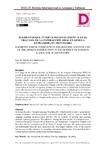Elementos que intervienen en el éxito –y en el fracaso– de la interacción oral en lengua extranjera en secundaria

View/
Use this link to cite
http://hdl.handle.net/2183/25475
Except where otherwise noted, this item's license is described as Atribución-CompartirIgual 4.0 España
Collections
Metadata
Show full item recordTitle
Elementos que intervienen en el éxito –y en el fracaso– de la interacción oral en lengua extranjera en secundariaAlternative Title(s)
Elements which Intervene in the Success -and Failure- of the Spoken Interaction in the Subject of Foreign Language in SecondaryAuthor(s)
Date
2020Citation
Plasencia Carballo, Z. (2020). Elementos que intervienen en el éxito –y en el fracaso– de la interacción oral en lengua extranjera en secundaria. DIGILEC: Revista Internacional De Lenguas Y Culturas / International Journal of Languages and Cultures, 6, 14-26. https://doi.org/10.17979/digilec.2019.6.0.5425
Abstract
[Resumen] A lo largo de las últimas décadas, la Didáctica de las Lenguas Extranjeras (DLE) ha gozado de un gran interés por parte de la esfera académica y profesional, indagando cómo mejorar el proceso de enseñanza-aprendizaje e implementar alternativas que permitan al docente cumplir con su rol de guía, y asistir a su alumnado durante dicho proceso. No obstante, de los cuatro modos de comunicación –Common European Framework of References for Languages. Companion Volume with New Descriptors– que fundamentan la enseñanza de las LE (recepción, producción, interacción y mediación), la interacción oral recibe una menor atención por parte del docente y ofrece resultados poco alentadores. Por esta razón, a lo largo de este artículo se ofrecerán algunas de las razones por las que esto ocurre, en especial en la etapa de Secundaria, además de sugerir una serie de alternativas que faciliten el siempre arduo proceso de hablar e interactuar en un código distinto al materno. [Abstract] In the last decades, Foreign Language Teaching (FLT) has been the centre of great interest among academics and professionals concerned about the ways to improve both the language teaching methodologies and the role of teachers in guiding and assisting students’ learning processes. Nevertheless, among the four modes of communication –Common European Framework of References for Languages. Companion Volume with New Descriptors– underpinning the teaching of foreign languages, the spoken interaction has traditionally been the most neglected one. This paper explores some of the reasons that account for this situation in secondary education and presents ideas and alternatives to help students interact orally in the foreign language.
Keywords
Interacción oral
Secundaria
Lenguas extranjeras
Enseñanza
Inglés
Oral interaction
Secondary
Foreign languages
Teaching
Secundaria
Lenguas extranjeras
Enseñanza
Inglés
Oral interaction
Secondary
Foreign languages
Teaching
Editor version
Rights
Atribución-CompartirIgual 4.0 España
ISSN
2386-6691






